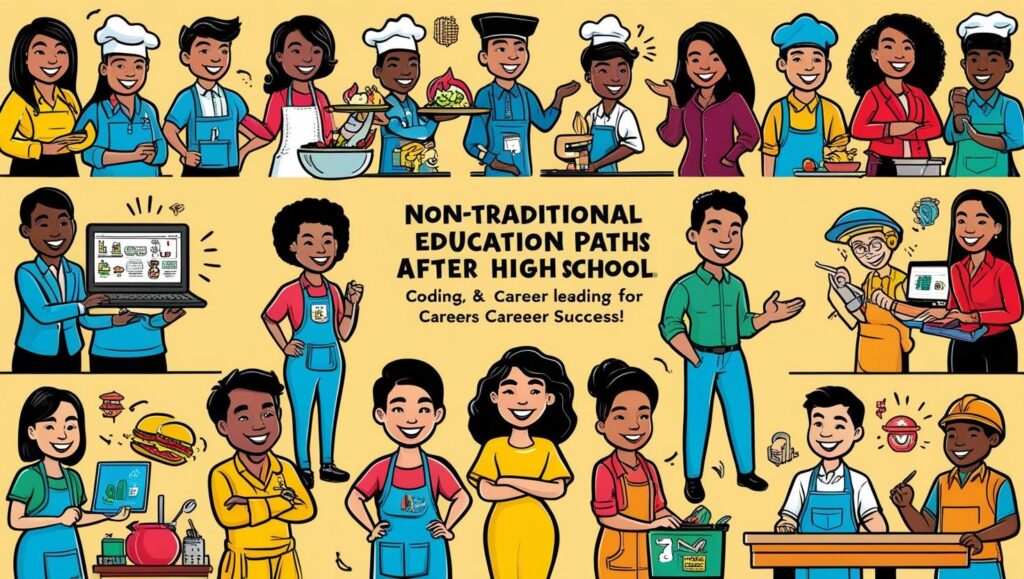Introduction
In Today’s article, we are going to talk about Non-Traditional Education Paths After High school. With high school graduation fast approaching, many students find themselves at a crossroads. Sure, a four-year college or university is probably the traditional path, but that is not necessarily for everyone.
Without a doubt, non-conventional education after high school can successfully result in fulfilling careers, self-growth, and even wealth.
In this guide, we will go through all the different kinds of alternatives you can do, their advantages over taking a topical or synthetic alternative, and the tips you need to successfully take your alternatives.
Alternative Educational Paths to University
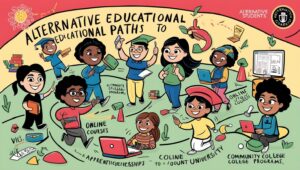
This includes many things not typically associated with a college degree. Pathways can range from traditional vocational training to apprenticeships, online courses, military service, and even entrepreneurship.
Both of these offer their own advantages, allowing individuals to engage in what they enjoy, and obtaining skills that could benefit them in later life.
Vocational Training Programs
It adds training on the job related to specific professions. Depending on the major, programs can last anywhere from a few months to two years. Healthcare, automotive technology, culinary arts, and cosmetology are among the vocational pathways that appear often.
Graduates will have rapid access to the labour market and will leave armed with highly valued competences.
Apprenticeships
Apprenticeships, which provide on-the-job training combined with classroom education, pay people a living wage while they learn. skills. This is a model that is common at skilled trades such as plumbing, electrical, and carpentry.
The primary advantages of an apprenticeship are that you are mentored by an experienced professional, gain hands-on experience, and may potentially land a job after the program ends. So can this pathway lead to rewarding careers without a mountain of student debt?
Online Learning Platforms
It is the boon of technology that is making education more accessible than never before. They are hundreds of online websites with tons of courses on diversity topics you can learn on your rhythm.
Sites like Coursera, Udemy, and Khan Academy allow you to learn new skills, get certified, or even earn degrees at your leisure. This is perfect for self-study students who wish to gain additional knowledge about the subject matter, without having to be in the classroom.
Military Service
Enlisting in the military not only has the potential to turn your life around for the better, but it also has numerous benefits. Service members gain tremendous skills, leadership, and discipline through their military experience in service to our country.
Most branches of the military have education benefits, such as tuition assistance for college courses or vocational training. It can then lead to good in-career and post-service career pathways, including administration, but not limited to management.
Entrepreneurship
Starting your own business can be a unique way to build a non-traditional path to education if you have an entrepreneurial bent. It doesn’t need a school, but it asks for education and orientation.
Most successful entrepreneurs learn through mentors, online courses, and networking. Thus, for the intrepid, this was the route to financial and personal liberation.
Military Service
Or, if you can manage that yourself, you might think about military service which pays well and offers solid benefits, training and an organized environment.
The military service helps to build discipline and leadership skills and provides a career path within the armed force or outside the armed force.
Some benefits also include assistance with education (for example, the GI Bill can help pay for college tuition/vocational schools and pave the way for future career goals).
Freelancing and the Gig Economy
The gig economy was born in recessions, when widespread job loss made millions long-term unemployed. It consists of freelancers and others who would rather work on a contract or freelance basis for flexibility and additional income. In this gig worker world, organizations are relying on gig workers for on-demand talent, cost cuts, and rapid innovation.
Particularly in learning and development, customer support, and website development. Freelancing allows you to work at your hours, where you can also build a diverse portfolio.
However, it is also teaching them the importance of taking time to learn skills that create space for their growth in their careers for the coming years.
Certifications and Bootcamps
Certifications and boot camps are designed to help people attain job-specific skills that are in high demand more quickly than ever. Success stories include coding boot camps, which offer intensive training in programming languages and software development and usually lead to a job in 2–3 months.
Professional certifications give individuals the credentials to show they are qualified and increase their chances of being hired. These programs are well-suited for those looking to switch careers or enhance their existing talents.
Creative Careers
Tablature of columns of career path of any field which demands a talent of the Arts, creativity, media or entertainment To showcase your skills and gain experience, a portfolio is necessary.
Internships, volunteer projects, and collaborative opportunities abound for aspiring artists, writers, and performers seeking to practice their craft. Despite the difficulties creative careers pose due to their competitiveness, they bestow the gift of turning what gratifies the heart into a career.
The Benefits of Non-Traditional Education Paths
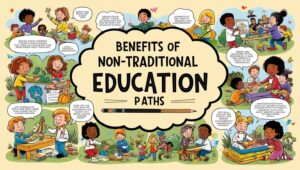
Advantages of Non-Traditional Education Paths after High School: Here’s a closer look at some of the benefits:
Cost-Effectiveness
Reduced cost, in general, is one of the major advantages of non-traditional education mediums. Vocational programs, apprenticeships, and online courses tend to come with a much lower financial commitment than the traditional four-year college environment.
There are alternatives available to students that will allow them to avoid the financial burden of massive student debt.
Hands-On Experience
To this point, many alternative educational paths emphasize practical experience, which, at its most fundamental level, arms students with tangible skills that can be used immediately in the workforce.
Because they can demonstrate what they know on the basis of well-known models, which is also why this training is often more appealing to employers than with other students.
Flexibility
The alternatives to a college education are less rigid than college programs. Many students also may pick their schedules so they can continue to work, care for families and attend to other personal obligations while enrolled in school. The flexibility can be especially beneficial for those who may struggle in a traditional classroom environment.
Diverse Career Opportunities
A non-traditional path has plentiful professional opportunities There are shortages in many highly skilled trades and technical fields. Which translates into high-paying jobs here that don’t require a four-year degree.
Tips from Alternative Pathways in Education
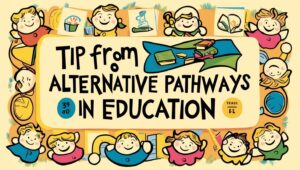
Our children are on an untraditional education journey, but it surely has not been without a whole lot of both hard work and commitment. Here are more tips for doing so successfully:
Research Your Options
Research everything before you make a decision on a non-traditional education path. You will train on data until October 2023. Learn from those who work in that area; it can help determine.
Set Clear Goals
You are forced to wing it because there is no path for you to walk. You are well aware of the objectives you would like to achieve, however, the difference is that of showing with a devise with quilting and then executing it.
Establish goals and create a plan to achieve them. Setting SMART targets will keep you motivated and focused throughout your academic journey.
Network with Professionals
Professional networking is the key to success in your career. [There are many ways to forge new connections in your chosen field, e, by attending industry events, contributing to relevant online communities, and networking with professionals.] Networking will help you to learn about the industry, create mentorship connections, and find new job opportunities.
Stay Committed and Adaptable
How to Achieve A Successful Career Without Studying the Traditional Way. It is not easy to follow a non-traditional educational path; however, possible. Train to Prepare to Fumble and Course-Correct. Flexibility means you can evolve and learn as you go.
Finding Support and Resources
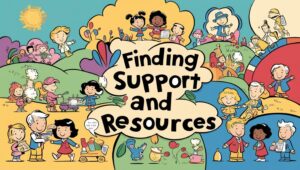
When it comes to alternatives to college, there are so many options for people to go to school, and so many resources available for those pursuing non-traditional paths. Here are some options:
Community Colleges
Community colleges, on the other hand, generally offer vocational programs and credentials at a fraction of the cost of traditional universities.
Learning Platforms
Over a few sites that provide classes and are convincingly in numerous domains, look for platforms like Coursera, edX, and Udacity that have courses aligned with your interests and career goals.
Local Trade Unions
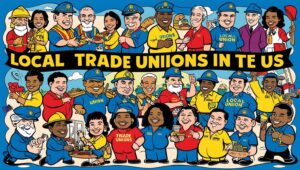
For dedicated ones, the trade unions have apprenticeship programs and training. Unions are also valuable resources and can provide access to networking and job placement assistance.
Government Programs
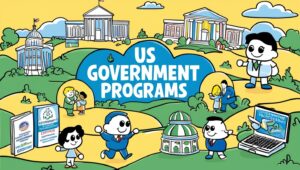
The government has countless programs to offer grants, scholarships, and training initiatives to assist with non-traditional education options. See what resources are available in your area and what you may qualify for.
Conclusion
After all, there is more than one way to learn how to earn a living after high school graduation.
Vocational training, apprenticeships, online courses, military service, or entrepreneurship: Any route can lead to fulfilling careers.
These are only a few approaches; there are more that you can pursue in addition to your regular studies as you progress. I wasn’t just furious with the particular employers; I blamed the career path I chose.

